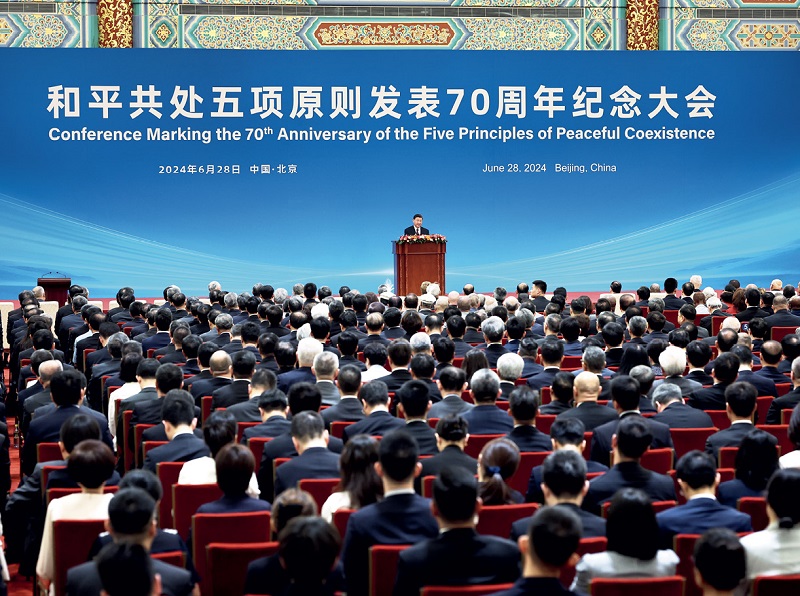
A conference marking the 70th anniversary of the Five Principles of Peaceful Coexistence is held in Beijing on June 28, 2024.
A conference marking the 70th anniversary of the Five Principles of Peaceful Coexistence, a cornerstone of Chinese foreign policy, was held in Beijing on June 28, attracting attendees from around the world, including former political leaders from some 20 countries. At the conference, President Xi Jinping made an important speech in which he said that the Five Principles “marked a groundbreaking and epoch-making achievement in the history of international relations.”
Seventy years ago, Chinese leaders put forth in full the following Five Principles – mutual respect for sovereignty and territorial integrity, mutual non-aggression, mutual non-interference in each other’s internal affairs, equality and mutual benefit, and peaceful coexistence. These principles were included in China’s joint statements with India and Myanmar, which called for establishing the Five Principles of Peaceful Coexistence as the basic norm in state-to-state relations.
The Five Principles of Peaceful Coexistence put forward by then Chinese Premier Zhou Enlai, the greatest diplomat of the 20th century in my view, represents a very significant milestone in the long march toward a post-colonialist and post-imperialist new world order that is genuinely peaceful and equitable.
The era they were formulated in was undergoing profound global changes and in particular witnessing three separate but closely inter-related phenomena, namely, the emergence of socialism not simply as an idea but as a reality holding state power, initially in one country but then in a socialist camp encompassing much of Europe and Asia; the defeat of fascism in 1945 and the formation of the United Nations aimed at preventing war and promoting democratic global governance; the upsurge of national liberation movements and the beginning of great waves of decolonization that would lead to the formation of the Nonaligned Movement and the emergence and rise of the Global South.
The Chinese Revolution itself and the founding of the People’s Republic of China in 1949 reflected and impacted all these three historical currents. The October Revolution and the founding of the Soviet Union had inevitably raised the question of what relationship a socialist country should have with the capitalist powers and it was on this basis that Vladimir Lenin (1870-1924), founder of the Russian Communist Party, advanced a policy of peaceful coexistence.
Zhou applied and developed this concept while acknowledging the existence of states with fundamentally different social systems, and hence their coexistence was not a mere transient phenomenon but a reality that would exist for a long historical period. Therefore, it could not be simply treated as a temporary expedience or tactic but rather had to be raised to the level of theory.
His thinking also embodied Chairman Mao Zedong’s concept of there being both antagonistic and non-antagonistic contradictions. Specifically, the collapse of the colonial empires, and the rise of new emerging forces throughout Asia, Africa, and elsewhere, meant that a new world was emerging of countries with different social systems, cultures, religious beliefs, and so on, but which shared important common interests of being independent from imperialism and all facing the common needs of development, modernization, and poverty alleviation. This provided the basis for Premier Zhou and India’s first Prime Minister Jawaharlal Nehru (1889-1964) agreeing to the Five Principles and for the principles to form the bedrock of the 10 principles adopted by the Afro-Asian Conference held in the Indonesian city of Bandung in 1955.
A key test of the correctness or otherwise of a set of principles is whether or not they stand the test of time. Over the past 70 years, the Five Principles have only become more relevant and necessary. Embodying the principles of the UN Charter and representing the interests of the great majority of the people in every country, they are widely welcomed and supported by the overwhelming majority of states. Moreover, their virtue and necessity can be seen in the appalling tragedies that result from a failure to uphold them, whether in Iraq, Afghanistan and, of course, above all today in Gaza.
The Five Principles are in turn embodied and further developed and applied in the important global initiatives put forward by President Xi with regard to security, development, and civilization. As with Premier Zhou’s initiative seven decades ago, these are increasingly widely welcomed by countries and peoples around the world, addressing, as they do, the key issues and imperatives of peace and development, and advancing the correct and realistic ways to tackle the existential threats facing humanity, such as nuclear war, climate catastrophe, and a collapse in biodiversity, and to promote the building of a community with a shared future for humanity.
As Xi said in his speech, both the Five Principles and the concept of a community with a shared future for mankind demonstrate the broad vision of the Communist Party of China to contribute more to humanity. “Looking at the past and future at this critical moment in history, we believe our exploration for the betterment of human civilization will not end, and our efforts for a better world will not end. No matter how the world evolves, one basic fact will not change. There is only one Planet Earth in the universe, and the whole humanity have one common home.” 
KEITH BENNETT is a senior analyst on international relations and co-editor of Friends of Socialist China based in London.